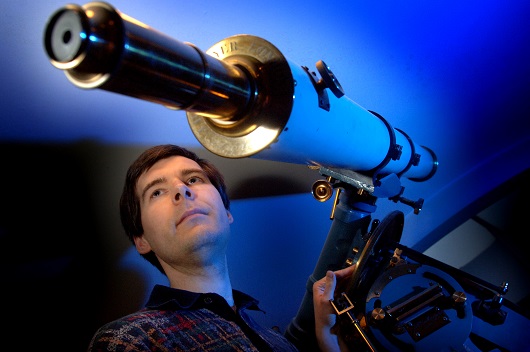From observing planets to observing Parliament

Dr Martin Dominik from the University of St Andrews’ School of Physics and Astronomy will be swapping his telescope for his overcoat, when he heads to London this week to visit Sir Menzies Campbell MP at the House of Commons for a “Week in Westminster” (commencing Monday 24 November) as part of a unique pairing scheme run by the Royal Society.
During his visit Dr Dominik will shadow Sir Menzies Campbell MP and learn about his work. As well as attending seminars and panel discussions, Dr Dominik will also attend Prime Minister’s Question Time and a Mock Science and Technology Select Committee. The visit will provide a behind-the-scenes insight into how science policy is formed as well as an understanding of the working life of a parliamentarian.
Dr Dominik said: “Scientists are too commonly thought to be living in their own detached world, no matter how eager they actually are to make science advance society. However, we cannot achieve this entirely on our own, and need to connect to those who have been elected to carry political responsibility.”
Sir Menzies Campbell MP said:
“I am looking forward to Martin joining me in Parliament as part of the ‘Week in Westminster’ Initiative and I hope it will further his understanding of how policymaking works. For my part I hope to learn more about the challenges and opportunities people like Martin encounter in their chosen fields and how politicians and policymakers can help promote their work and secure a future for the next generations of scientists.”
The Royal Society’s Pairing Scheme aims to build bridges between parliamentarians and some of the best scientists in the UK. It is an opportunity for parliamentarians and civil servants to become better informed about science issues and for scientists to understand how they can influence science policy.
Dr Dominik continued:
“We need to understand science as being an integral part of our society. It is crucial to many things of utmost value, such as mastering the societal challenges of the present and the future, fostering innovation for future prosperity, and educating current and future generations, thereby not only making the most efficient use of the human potential, but also drive societal transformation and overcoming political divides around the world.”
Sir Paul Nurse, President of the Royal Society said:
“Policy-makers and scientists have a responsibility to engage with each other to get the best possible scientific advice into public policy making. We set up the Royal Society’s Pairing Scheme in 2001 to provide the opportunity for MPs and scientists to build long term relationships with each other. We have now organised more than 300 pairings and have expanded the scheme to include partnerships between scientists and civil servants and members of the House of Lords.”
Dr Martin Dominik is a Reader in Physics & Astronomy and Royal Society University Research Fellow at the University of St Andrews. His research focuses on applications of the gravitational microlensing effect, and in particular on its potential for studying planets orbiting stars other than the Sun.
ENDS
NOTES FOR EDITORS
Further information about the Royal Society Pairing Scheme, as well as case studies, can be found at the following link: http://royalsociety.org/training/pairing-scheme/
The scheme is supported by The Government Office for Science. The Government Office for Science ensures that government policies and decisions are informed by the best scientific evidence and strategic long-term thinking. It is led by the Government’s Chief Scientific Adviser who advises the Prime Minister and Cabinet on all scientific matters.
Issued by the University of St Andrews Communications Office, contactable on 01334 462167 or [email protected].
Category Government